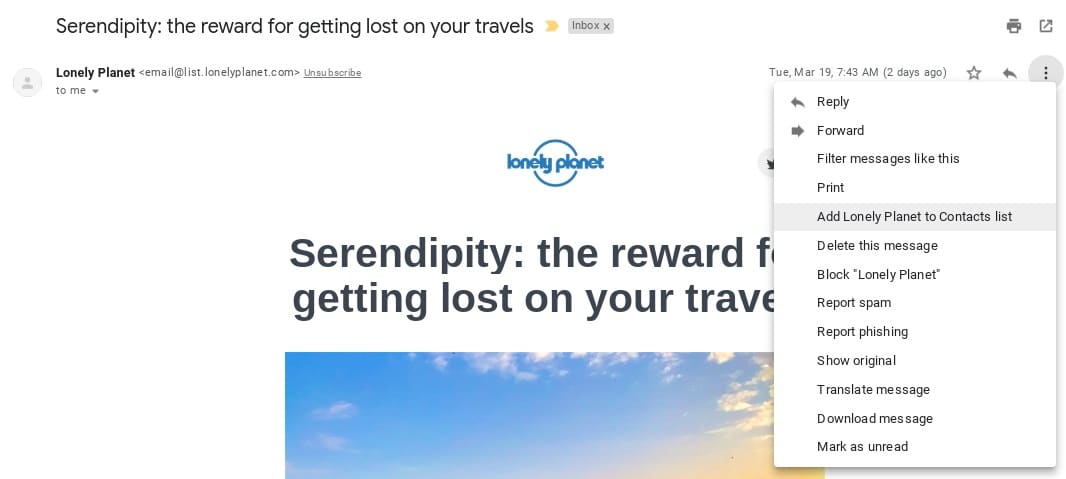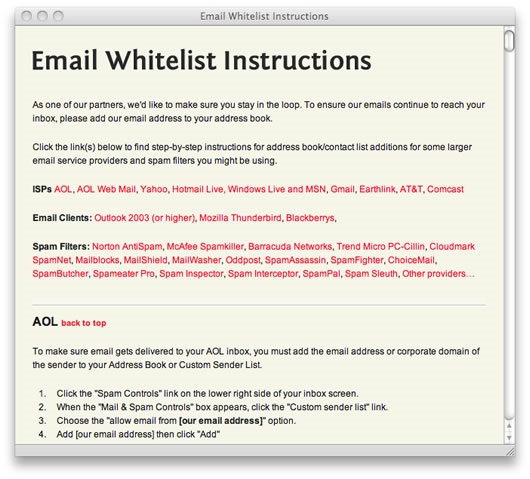Article first published in September 2010, updated April 2019
Concerned about your email campaign getting unintentionally stuck in your subscribers’ junk mail filters or promotions tab?
Perhaps you should consider adding a link to email whitelist instructions in your campaigns. This allows your subscribers to add you to their “Safe senders list” (or similar), guaranteeing that your email will pass through their filters.
How to Ask Subscribers to Whitelist Your Email Address
Read on to learn how to whitelist an email address in your own inbox and what that means. We’ll also provide examples of email whitelist instructions to send to your subscribers.
What does it mean to whitelist an email address?
When someone sends you an email, your email client (such as Gmail) analyzes the email’s data and contents to figure out what to do with it.
This system is vital for protecting us against dangerous spam and phishing attempts. You’ve probably noticed, however, that there are more categories than just spam and not-spam. Gmail, for instance, now automatically places certain emails into their Promotions and Social tabs.
Emails from Facebook, Twitter, or LinkedIn go into the Social tab, while most email marketing campaigns find their way into the Promotions category.
When you whitelist an email address, this ensures the email shows up in your Primary Inbox rather than other tabs. You’ll also get a notification on your device or desktop when you receive an email in your Primary Inbox, unlike emails that go into the Promotions category.
How to whitelist an email address in your own inbox while asking your subscribers to do the same
Whitelisting an email address is pretty easy on the user’s end, but it takes a few steps to get it right. You (or your subscribers) have a few options for whitelisting domains and specific addresses.
Here are a few images to explain how to whitelist an email address in Gmail.
Click on an email from the sender you want to whitelist. Click on the three dots to the right and select “add *sender name* to contacts list.” Your email client now knows that you want emails from this sender to go into your inbox rather than the spam folder.
This might not stop Gmail from sending these emails to the Promotions tab, though, so take one extra step. Go back to the Promotions tab or wherever you found the email you want to whitelist. Click on it and drag it into the Primary Inbox tab.
Gmail will ask if you want to send all emails from this sender to the Primary Inbox.
Gmail also lets you set up filters to categorize your emails easily. However, when you’re sending email whitelist instructions to your subscribers, this process can get a little convoluted, so it’s probably best to describe the method above to them instead.
Consider sending out a campaign to your subscribers asking them to go through this whitelisting process and explaining how to whitelist an email address. Later, you can segment your audience and retarget subscribers who didn’t open the original email.
Why should my subscribers whitelist me?
Despite your best efforts to make your campaigns as inbox-friendly as possible (and our constant efforts to keep everyone on the good side of ISPs), sometimes our campaigns either get flagged as potential spam or hidden away in a junk mail folder somewhere.
The majority of the time, it’s because we’ve accidentally done something to offend a particular email client, and this is where whitelisting steps in.
In short, whitelisting improves deliverability. It also reduces the chance of your email getting unnecessarily flagged as junk in the inbox.
How to include email whitelist instructions in your campaigns
Add a simple link to instructions like:
You’re receiving this monthly newsletter because you signed up via our site. Ensure it keeps coming.
Keen subscribers can pacify their sometimes-hyperactive junk mail filters and give your newsletter a wide berth. Thanks to this handy email whitelist instructions generator, this can be as simple as entering your campaign details, then adding the resulting instructions to your own site. Since the instructions are provided as a simple HTML page, you can copy, paste, and restyle them as you see fit:
Once you’ve added instructions to your site, you can link your email campaigns and templates to them. The whitelisting process only needs to be completed once per sender.
As the email whitelist generator provides instructions for most of the major email clients, it’s useful information for your subscribers to refer back to next time they have a campaign to whitelist. Finally, many thanks to Fire Mail for the excellent example and Email Delivery Jedi, for providing this easy Whitelist Email Instructions Generator.
Don’t forget to also get your email domain authenticated to ward off those pesky spam filters. It only takes a few minutes to set up and it’s something we recommend doing for every “from” email address domain you use.
Wrap up
Sending out some campaigns asking subscribers to whitelist your email domain is an excellent way to improve your open rate and even conversions.
Why? It helps give you a boost simply because your emails will be more visible in your subscribers’ primary inbox. After that, it’s up to you to write interesting subject lines that grab attention and copy that entices them to take action.
Do you need some more detailed email whitelist instructions? Check out our in-depth guide to whitelisting best practices.









